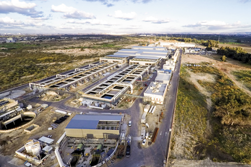Just a few years ago, in the depths of its worst drought in at least 900 years, Israel was running out of water.
Drought and agricultural collapse across the Middle East have produced a lost generation with no prospects and simmering resentments. Iran, Iraq and Jordan all face water catastrophes. Water shortage is driving the entire region to desperate acts.
Except Israel. Amazingly, Israel has more water than it needs.
The turnaround started in 2007, when low-flow toilets and showerheads were installed nationwide and the national water authority built innovative water treatment systems that recapture 86 percent of the water that goes down the drain and use it for irrigation — vastly more than the second-most-efficient country in the world, Spain, which recycles 19 percent.
Even with the remarkable results achieved through national campaigns to conserve and reuse water resources, Israel still needed about 1.9 billion cubic meters (2.5 billion cubic yards) of freshwater per year and was getting just 1.4 billion cubic meters (1.8 billion cubic yards) from natural sources. That 500-million-cubic-meter (650-million-cubic-yard) shortfall was why the Sea of Galilee was draining like an unplugged tub and why the country was about to lose its farms.
Enter desalination. The Ashkelon plant, in 2005, provided 127 million cubic meters (166 million cubic yards) of water. Hadera, in 2009, put out another 140 million cubic meters (183 million cubic yards). The new Sorek plant added 150 million cubic meters (196 million cubic yards) to that. All told, desalination plants can provide some 600 million cubic meters (785 million cubic yards) of water a year, and more are on the way.
Desalination used to be an expensive energy hog, but the kind of advanced technologies being employed at Sorek have been a game changer. Water produced by desalination costs just a third of what it did in the 1990s. Sorek can produce a thousand liters of drinking water for 58 cents. Israeli households pay about US$30 a month for their water — similar to households in most U.S. cities, and far less than Las Vegas (US$47) or Los Angeles (US$58).
Desalination works by pushing saltwater into membranes containing microscopic pores. The water gets through, while the larger salt molecules are left behind. But microorganisms in seawater quickly colonize the membranes and block the pores, and controlling them requires periodic costly and chemical-intensive cleaning.
Pioneering work at Israel’s Zuckerberg Institute for Water Research produced a chemical-free system using porous lava stone to capture the microorganisms before they reach the membranes. It is just one of many breakthroughs in membrane technology that have made desalination much more efficient.
Israel now gets 55 percent of its domestic water from desalination, and that has helped to turn one of the world’s driest countries into the unlikeliest of water giants. The Sea of Galilee is fuller, Israel’s farms are thriving, and the country faces a previously unfathomable question: What to do with its extra water?
Israel supplies Palestinians with more water than required by the 1995 Oslo II Accords, but it is still far less than what they need. Israelis will offer help to their water-starved neighbors in Egypt, Turkey, Jordan, the West Bank and Gaza at the upcoming Water Knows No Boundaries conference in 2018.
Another water cooperation path is Red Sea–Dead Sea Canal development, a joint venture between Israel and Jordan to build a large desalination plant on the Red Sea where they share a border. This 900 million dollar project will divide the water among Israelis, Jordanians and the Palestinians. The brine discharge from the plant will be piped 100 miles north through Jordan to replenish the Dead Sea. By 2020, these old foes will be drinking from the same tap.
Source: Ensia


No comments:
Post a Comment
Please be assured that we are moderating comments for spam, not dissent.
Thank you for sharing your opinion!
NOTE: We will not publish any comments containing hyperlinks that are not directly relevant to the post